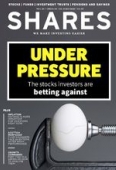Archived article
Please note that tax, investment, pension and ISA rules can change and the information and any views contained in this article may now be inaccurate.
Where next for Scottish Mortgage as trust managers face up to investors

With hundreds of investors granted the opportunity to ask questions in person to Scottish Mortgage’s (SMT) fund managers at an event in London, you might have expected some angry audience members given the investment trust’s share price at 676.2p has fallen 56% since peaking in November 2021.
However, attendees of the Baillie Gifford event in mid-June were either too polite to vent any frustration at the managers or they were incredibly patient as there was little sign of anger or malice on the night.
The audience were certainly eager to ask questions with a sea of hands raised, hoping for their chance to prise new insights from the people making the key decisions – Tom Slater and Lawrence Burns.
Perhaps a key reason why the audience was relatively sanguine was down to the managers pre-empting the types of questions they might receive and giving this information upfront to calm some nerves.
NOT SHORT-TERM TRADING
From the start, the focus was on explaining the trust’s investment process and why the duo have not tinkered with the portfolio in the wake of the shifting market conditions.
‘We are not smart enough to trade the market,’ said Burns. ‘Even the best investments endure tough conditions and downturns. We have to accept that share prices will be volatile.
‘While we remain long-term in focus, we are not blind to the reality that now is a painful period (for markets).’
Slater insisted Scottish Mortgage wouldn’t deviate from its end goal, to find ‘outliers’, companies that have the potential to be truly great in the future.
In the current market some growth managers might be tempted to buy stocks like Shell (SHEL) which is benefiting from high oil prices.
Scottish Mortgage would never dream of going down this path. There was no hint of even considering short-term opportunities just to limit share price losses for the investment trust.
It’s all about staying focused on the long-term and sticking to the trust’s key interests – digitisation of society, the intersection of biology and technology, and the energy transition.
DIFFERENT THINKING
Slater recalled a comment from billionaire investor Charlie Munger, vice chairman of Warren Buffett’s Berkshire Hathaway (BRK.B:NYSE) conglomerate, who said many hard problems are best solved when they are addressed backwards or ‘inverted’.
Burns said it was hard to imagine the world needing fewer computer chips from the likes of ASML (ASML:NASDAQ) and Nvidia (NVDA:NASDAQ) given technology is advancing everything we do and touch.
In parts of the world, e-commerce still only accounts for a small chunk of retail sales, so the manager remains supportive of the opportunities for companies like MercadoLibre (MELI:NASDAQ) which is often called the ‘Amazon of Latin America’.
The trust’s biggest holding is Moderna (MRNA:NASDAQ), which played a crucial role in the development of a Covid vaccine and there is a hope it could be involved in more critical medical breakthroughs in the future. ‘Just imagine if it could help address HIV, flu or even cancer,’ said Burns.
Tesla (TSLA:NASDAQ) is a big part of Scottish Mortgage’s portfolio as the trust says demand for its products far outstrips supply and there remains significant potential to grow earnings, with the car maker hoping to increase annual production 20-fold by the early 2030s to 20 million vehicles.
One audience member asked why the trust wasn’t investing in producers of metals critical to the electric vehicle revolution. In response, Slater said: ‘We don’t think batteries will be commoditised products for electric vehicles, the design of them will be very important. That’s why we invest in Northvolt, which recently struck a joint venture with Volvo to develop tailor-made batteries. That’s more attractive than investing in raw materials.’
STOCK RATING CONUNDRUM
A key reason why Scottish Mortgage’s share price has fallen this year is the plethora of companies in its portfolio which command high ratings because of future earnings potential, rather than the profit they make today.
The market’s rotation from growth to value has seen investors less willing to pay high multiples so we’ve seen a derating in stocks. Nobody knows how long this will last, and it certainly doesn’t help Scottish Mortgage that interest rates keep going up. Higher interest rates have a negative effect when calculating the present value of future cash flows.
This valuation correction could get even worse if the trust’s unquoted investments are marked down at the next quarterly review, which is plausible. As of 30 April, these private investments accounted for approximately 29% of Scottish Mortgage’s assets and this may have increased further given how the stock markets have weakened recently.
There will be the odd exception in its portfolio, such as Elon Musk-founded SpaceX, which recently raised $1.5 billion at a 25% uplift on the previous valuation. However, investment bank Investec believes private company valuations in general are coming under increasing pressure.
‘Scottish Mortgage has a clear and well-articulated philosophy and process which focuses on the identification of exceptional global growth companies, and then holding them for the very long term,’ says Investec.
‘The strategy was highly effective as equities recovered from the global financial crisis; over 10 years to March 2021, the company was ranked first out of 2,408 global investment vehicles.
‘However, in recent months, sharp falls in net asset value have been compounded by a de-rating. The company is enduring a perfect storm, and we believe the next few months could continue to be difficult,’ concludes Investec.
PREVIOUS MISTAKES
The idea that the share price could get worse before it recovers is something investors will have to think hard about.
This might explain why one person in the audience at the Scottish Mortgage investor event asked what the fund managers had learned from previous mistakes – implying they hoped there wouldn’t be any more, given the current fragile state of the trust’s share price.
‘We aren’t right all the time,’ replied Burns, giving the example of online furniture group Home24 (H24:ETR) which disappointed in terms of the ‘stability and capability of management’.
Another audience member was more controversial with their questioning, asking why Scottish Mortgage has gone so big on China when the country has a reputation for treating its workers so badly.
Some of the trust’s biggest Chinese investments are internet platforms Alibaba (9988:HKG) and Tencent (0700:HKG). ‘What happened if we didn’t invest in China?’ asked Burns. ‘If the West withdrew capital, there would be less interaction between China and the rest of the world. There would be less opportunity to have conversations on social issues as you wouldn’t have a seat at the table.
‘Before Alibaba and Tencent, the government controlled the flow of information. Now you can express opinions.’
THE BIG QUESTION: BUY OR NOT?
Scottish Mortgage says it doesn’t have a crystal ball, but its investment process requires taking a view on which companies will be winners or losers 10 years down the line.
Shares believes a lot of investors may have underestimated the risks involved with this process and they’re now finding out the hard way that investments with great stories don’t always translate into extra pounds in their pockets.
In recent years, the rotation from growth to value has only lasted a matter of months. There seems a good chance this trend might be different in 2022. We are facing a reset of monetary policy and the global economy could stutter while high inflation works its way through the system. While this is in motion investors could remain hesitant about paying up for future growth.
If you’re an existing Scottish Mortgage shareholder there is merit in sitting tight if you understand the risks. A lot of bad news is already in the price so there is no point locking in this year’s losses by selling now.
However, what’s missing is an obvious catalyst to drive a near-term recovery in the stock. In January, Ian Conway wrote in Shares that Scottish Mortgage was worth buying after a 33% fall, albeit drip-feeding money into the market rather than going all-in at once. Since then, we’ve had the Ukraine crisis which has caused inflationary pressures to intensify and has made the backdrop even worse for highly-rated growth stocks.
POCKETS OF VALUE
Admittedly not everything in Scottish Mortgage’s portfolio is pricey. Its biggest holding, Moderna, is firmly in value territory, with cash equivalent to a quarter of its market value and the shares trading on a mere 6.8 times the next 12 months’ expected earnings, according to Refinitiv.
Alibaba and Gucci-owner Kering (KER:EPA) are both trading on 15 times earnings or less. The remainder of the trust’s top 10 holdings are in the range of 25 to 65 times earnings, excluding shopping platform Meituan (3690:HKG), which is forecast to be loss-making in 2022.
In the current market, those ratings are unappetising and a prospective investor thinking about taking a position in Scottish Mortgage shares needs to recognise the headwinds that could stop the share price recovering in the near term.
Important information:
These articles are provided by Shares magazine which is published by AJ Bell Media, a part of AJ Bell. Shares is not written by AJ Bell.
Shares is provided for your general information and use and is not a personal recommendation to invest. It is not intended to be relied upon by you in making or not making any investment decisions. The investments referred to in these articles will not be suitable for all investors. If in doubt please seek appropriate independent financial advice.
Investors acting on the information in these articles do so at their own risk and AJ Bell Media and its staff do not accept liability for losses suffered by investors as a result of their investment decisions.
Issue contents
Education
Feature
Great Ideas
Investment Trusts
News
- Supermarket sales slide extends to over a year as shoppers trade down
- Trustpilot pulls forward breakeven target at its big investor day
- Henderson manager hits the sell button on Shell
- Why Primark's plan to trial new click and collect service could be smart
- How rising interest rates are increasing the risk of recession

 magazine
magazine








